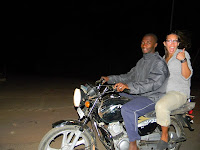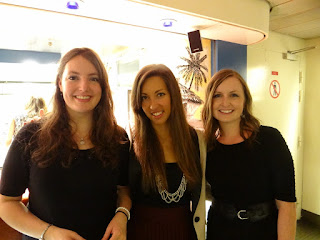Below is a story about one of the patients that was helped on the ship during my time here in Guinea.
Rather than joyous celebration, the reaction to Yaya’s birth was
broken family ties. Yaya’s mother, Salematou, and his father, Abdulaye,
were not married when their son was born. The tradition that Salematou’s
father lived by did not make room for a child born out of wedlock.
Despite Salematou’s pleading with her father to allow her to keep her
child, his decision was final. As soon as Yaya could leave his mother’s
breast, he was sent to live with Kadiatou, his grandmother on his
father’s side.
Living with his grandmother turned out to be a
wonderful blessing for Yaya. Kadiatou personifies the bottomless heart
and limitless space that African grandmothers offer their children and
their children’s children. She assumes whatever responsibility comes her
way, no matter the burden. Kadiatou explains, “There are many mouths
that I feed in my family. In addition to Yaya, five of my children and
their nine children need my support too. Everyone shares in the work of
the household, but earning income in Conakry is very difficult. My
husband now, Mamadouba, is very old. He gives what money he can, but he
has family to support too.”
Yaya stole his grandmother’s heart
from day one. His ready smile and eagerness to be close to her formed a
thick bond. When tragedy struck Yaya, Kadiatou was distraught. “Yaya
started walking when he was one year old, but after taking a few steps
he would fall. We tried many traditional medicines, but his condition
grew worse. At eighteen months, his legs started to twist and curl up.
They failed him entirely.”
Yaya’s uncle, also named Yaya,
remembers this as a time of many trials for his mother. “Kadiatou was
so afraid for Yaya. He often had a high fever, and his legs would cramp
up terribly. He would cry for hours from the pain. Kadiatou tried
everything to soothe him. She held him for hours. Then my father and
sister died very close together. My mother’s heart was broken into so
many pieces.”
Kadiatou, who had taken in her daughter’s five
children, decided that moving the family to Conakry, the capital of
Guinea, was best for Yaya. “I hoped that the medical care Yaya needed
was in a big city. As well, I knew that Conakry had schools for
handicapped children that Yaya could attend.” Another important reason
for the move was that Kadiatou was protecting Yaya from the villagers
who thought that children with disabilities were cursed. She would not
stand for her grandson being tormented, ridiculed, or forced into
hiding.

When Yaya reached five years of age, he started attending
the school for handicapped children. “I was so happy for Yaya. He
started to learn his letters and bring home things he made,” Kadiatou
says. Although there were no school fees and transportation was
provided, Kadiatou still had expenses to cover, like school supplies.
She made ends meet by going to the Grand Mosque daily and helping with
cleaning and cooking. After a full year of being a volunteer, she was
finally included in the group that received a weekly stipend, plus
donations of money and food from appreciative people attending the
Mosque.
Yaya often joined Kadiatou at the Mosque after school, and
he soon became a favorite with everyone. In the Muslim faith, people
are eager to help the needy as a way of observing
sadaqah, the
duty to overcome miserliness. Many Muslims wanted Yaya to join the group
of handicapped people who begged, so that people could give to him.
Kadiatou was against Yaya’s doing this, regardless of the enormous
struggle she had to support the family. “I faced so much pressure to
allow Yaya, in such obvious need, to help people fulfill their duty to
sadaqah. I finally relented,” she explains.

Kadiatou continued to be distressed with Yaya’s participating in
sadaqah.
She prayed that Yaya would get his education and find an occupation
where he could use his sharp mind and very able hands. Kadiatou had many
doubts about her prayer being answered, but she remained faithful,
clutching that thin bit of hope to her heart.
Yaya himself dared
not hope. But then an incredible set of circumstances unfolded around
him. Nick Veltjens, who worked with orthopedic patients, saw Yaya at the
patient screening location the day before consultations began. “I
waited all screening day for Yaya to come because I thought we could
help him. We didn’t see him that day, so I sent an email around asking
if anyone knew where he was.”

According to Yaya, “I did go to the screening with my friend, but I lost my courage.” Yaya left without being examined.
The
next day, Dan Bergman, a long-term hospital volunteer, came to Nick
with a video of a possible orthopedic patient that he had just seen
outside the Mercy Ships Dental Clinic. According to Nick, “What a
coincidence that Dan found the same little guy that I was looking for!”
For
Dan, this series of events said loud and clear that, “God wanted Yaya
to find Mercy Ships. He kept putting him in front of us!” Dan tracked
Yaya down at the Mosque and delivered the news that he had an
appointment at the hospital ship.
But Yaya missed his appointment.
As he says, “I did not believe I could be healed, and so I did not want
to tell my grandmother to bring me. She would be too disappointed.” But
another divine coincidence occurred that finally put Yaya and Mercy
Ships together. A government official, Cellou, who had befriended Yaya
at the Mosque, was at the Mercy Ships Dental Clinic that same week. He
casually asked what a young boy with deformed legs needed to do to get
an appointment. It was quickly realized that the boy in question was
Yaya and that he just needed someone to bring him to his appointment.

Cellou
immediately went to Yaya’s grandmother with the news about Yaya’s
appointment. They agreed that Cellou would go to the hospital ship with
the boy. When Kadiatou received the telephone call from Cellou telling
her that Yaya was accepted for surgery, she experienced a mixture of
emotions. “I was so grateful that Yaya could be helped. It was all that I
had prayed for. But I was also very uncertain and afraid. I wondered
how it would be possible to fix Yaya’s legs and what he would go
through.”
Dr. Frank Haydon, volunteer orthopedic surgeon, was able
to fix Yaya’s legs. According to Dr. Frank, “The condition that Yaya
was born with caused his bones to be very brittle. As he started to
walk, the pressure on the bones caused multiple fractures. The surgery
he had aligned his leg bones properly, and the two rods I installed will
give his legs the needed strength and structure so he can walk.”
Each
day Yaya does grow stronger. He is starting to take his own steps with
the help of a walker, and he has progressed to simple below-the-knee leg
casts. But at the same time, each day wears on Kadiatou. She shows the
strain of being away from family and being indebted to more and more
neighbors. She has borrowed money from them for food and malaria
medication. However, regardless of the hardship, Kadiatou’s commitment
to see Yaya through his healing journey is unwavering. “I would endure
anything so Yaya can do what he longs to do more than anything else –
play football. By suffering for Yaya and my family now, I know that
there will be great happiness in the future,” she says.

According
to his uncle, Yaya’s journey to hope and healing is summed up in a few
words: “Yaya is so loved by everyone on Mercy Ships.” And, still, even
with so many kind hearts embracing Yaya, there is one who continues to
occupy the most special place in his heart. As clear as a bell, Yaya
declares, “I love my Grandmother so much! She has done everything for
me.”
Written by Joanne Thibault
Edited by Nancy Predaina
Photos by Debra Bell and Michelle Murrey
.jpg)
.jpg)
.jpg)
.jpg)
.jpg)
.jpg) - Besides car taxis a lot of people get around using moto-taxis. And like the taxis they enjoy piling things on those as well (multiple children, boxes, chicken, multiple loaves of bread). While we were in Kindia there was an opportunity for us to have a go at riding on the back of one. My first time on a motorbike and let me tell you it is all kinds of awesome. (Please don't freak out too much Mom. It was safe. Promise.)
- Besides car taxis a lot of people get around using moto-taxis. And like the taxis they enjoy piling things on those as well (multiple children, boxes, chicken, multiple loaves of bread). While we were in Kindia there was an opportunity for us to have a go at riding on the back of one. My first time on a motorbike and let me tell you it is all kinds of awesome. (Please don't freak out too much Mom. It was safe. Promise.).jpg)
.jpg)
.jpg)
.jpg)
.jpg)
.jpg)
.jpg)
.jpg)
.jpg)
.jpg)
.jpg)
.jpg)
.jpg)
.jpg)
.jpg)
.jpg)
.jpg)
.jpg)
.jpg)
.jpg)
.jpg)
.jpg)
.jpg)
.jpg)
.jpg)
.jpg)
.jpg)
.jpg)
.jpg)
.jpg)
.jpg)
.jpg)
.jpg)
.jpg)
.jpg)
.jpg)
.jpg)
.jpg)
.jpg)
.jpg)
.jpg)